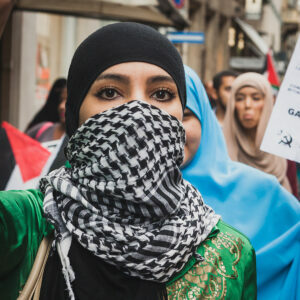For an alternate viewpoint, see “Point: Protesters Are Adamant — Eliminate Israel.”
University campuses nationwide have long been the focus of political debates and battles in the form of protests and demonstrations. In recent weeks, students galvanized by their consciences have been leading an anti-war movement that our nation hasn’t seen the likes of in decades, and it is spreading like wildfire. At last count, at least 100 Gaza solidarity encampments have been launched at colleges and universities.
These students are setting up tents, staging sit-ins, and raising their voices in solidarity with the people of Gaza. But their courageous actions are about more than protesting the war. They’re about demanding justice, challenging authority, and reshaping and normalizing the conversation around one of the most pressing issues of our time — freedom and liberation for Palestine.
The urgency of this moment is spurred by the reality that for more than 200 days, they, along with the rest of the world, have witnessed the Israeli government’s brutal massacring of at least 34,000 Palestinian civilians in Gaza, including more than 14,000 children.
On April 30, Haaretz reported that Israeli Finance Minister Bezalel Smotrich, who is a member of the security cabinet, called for the “total annihilation” of Rafah and other areas of Gaza. He said: “There are no half measures. (The Gazan cities of) Rafah, Deir al-Balah, Nuseirat — total annihilation. ‘You will blot out the remembrance of Amalek from under heaven.”
This genocide is being waged with American students’ tax and tuition dollars. A growing number of them recognize they have a moral obligation to mobilize swiftly against the Israeli government’s violent, catastrophic rampage bolstered by the Biden administration and Congress.
These students feel compelled to act, knowing it’s wrong for their colleges and universities to invest their tuition funds into weapons manufacturing companies like Lockheed Martin and Boeing, enabling these institutions to profit off Israel’s military campaigns against Palestinians.
They’ve done their homework, and they know that many universities, such as Yale, aren’t obligated to disclose most of their investable assets in SEC filings, and their investment portfolios are often not publicly accessible. This lack of transparency means there’s no way of knowing the actual dollar amount their institutions are investing in these companies.
That’s why two of the critical demands of many student protesters launching encampments, such as at Johns Hopkins University, is that their universities disclose financials and divest from weapons manufacturing companies.
Student activists courageously leading the charge to demand justice, transparency and accountability are risking their safety, freedom, education, future, and even lives. They deserve our gratitude, attention and support. Instead, as one student put it, “We’re often met with tear gas, threats and intimidation.”
According to sources, more than 1,200 people have been arrested in college protests. That number has risen as New York officers stormed Columbia University and arrested dozens more people Tuesday.
To understand the significance of what’s happening on campuses today, we must first look back at history. In 1970, during the Vietnam War, the world was shaken by the events at Kent State University. Students protesting the war were met with violence, and four students were tragically killed by the National Guard. The Kent State shootings became a symbol of the struggle for justice and a rallying cry for those who refused to accept the status quo.
Today, the parallels between Kent State and the Gaza solidarity encampments are impossible to ignore. Just as the students at Kent State were protesting the violence of war, today’s students are protesting Israel’s decades-long violence and oppression of the Gazan people. They are demanding an end to Israel’s illegal occupation of Palestine, lifting the siege on Gaza, and an end to violations of Palestinian human rights. Like the students at Kent State, they are too often facing criticism, pushback and violence for daring to speak out.
Despite their challenges, these students are determined to make their voices heard. As one student organizer said, “The violence I’m risking here can’t compare to the violence Hind Rajab experienced there.”
They acknowledge that they’re protesting on their campuses while there are no universities remaining in Gaza. They recognize that silence in the face of oppression and genocide is not an option. They believe in the power of collective action and the importance of standing up for what is right. And they’re willing to do what many others lack the courage or conviction or willpower to do: risk sacrificing to fight for a better world.
The significance of the current campus activism represents an unequivocal rejection of the politics of fear and division. It’s a reminder of what’s possible when people unite and organize.
Perhaps most important, it’s a testament to the power of young people, proving they can shape the course of history and to create real change. They are a reminder that the future belongs to those who are willing to stand up and fight for what they believe in.
These students are on the right side of history. They inspire hope. They deserve our advocacy and solidarity. Please support their efforts, amplify their voices, and join them in the fight for a better world.





